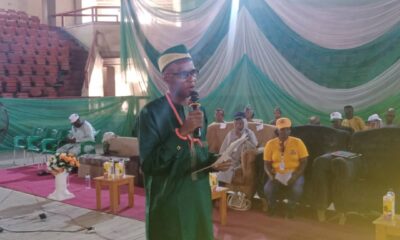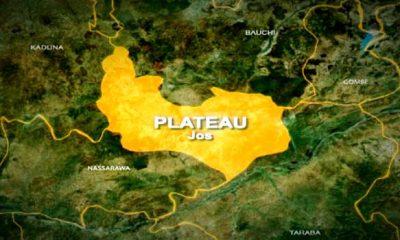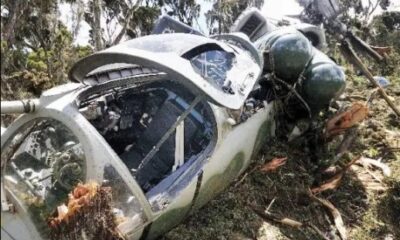News
Man Sentenced To Prison For Stealing Laptop In Benin
Published
4 years agoon
By
Editor
Esohe Ighodan of Egor Magistrates’ Court in Benin, Monday January 20, sentenced a 26-year-old man, Udoh Effong, to one month in prison for stealing a laptop from his employer
Ighodan sentenced Effong, after he pleaded guilty to stealing and begged the court for leniency.
The convict was convicted and sentenced on one count charge.
According to the Magistrate, the convict was sentenced for facts and tenders of exhibits.
READ ALSO: Five Die As Hot Water Pipe Bursts In Hotel
The convict, however, told the court that he had work with the complainant for 10 months, adding that the complianant he paid N68,000 to balance up N132,000.
The convict, however, alleged that the complainant refused to pay him the balance, hence he carried his laptop and gave his friend to keep it for him.
He added that his friend later gave the complainant the laptop.
The complainant however denied the allegation.
The Magistrate, Ighodan, however, gave the convict an option to pay a fine of N10,000.
READ ALSO: Lagos Pipeline Explosion Update: Five Die, 20 Injured, 39 Vehicles Razed, 150 People Displaced
Earlier, the prosecutor, Inspector Sunday Lucky, told the court that the offence was committed on Dec. 27, 2019 at upper Ekenwan , Ugbiyokho, Benin.
Lucky said that the convict stole HP laptop valued N68,000, a property of Mr Jude Akehe
The prosecutor said the offence contravened the provision of sections 390(9)of the Criminal Code Cap. 48 Vol. 11, Laws of the defunct Bendel State of Nigeria, 1976, now applicable in Edo.
READ ALSO: S’ Court Verdict: Bauchi Politicians Spend Sleepless Nights In Mosques
PHOTO: File
You may like
News
BREAKING: Dangote Further Crashes Diesel, Aviation Fuel Price
Published
2 hours agoon
April 23, 2024By
Editor
Dangote Petroleum Refinery has again announced a further reduction in the prices of diesel and aviation fuel to N940, N980 per litre respectively.
This is coming at the wake of its widely celebrated price reduction to N1,000 barely two weeks ago.
The price change of N940 is applicable to customers buying five million litres and above from the refinery while the price of N970 is for customers buying one million litres and above.
Speaking on the new development, the Head of Communication, Mr Anthony Chiejina, explained that the new price is in consonance with the company’s commitment to cushion the effect of economic hardship in Nigeria.
“I can confirm to you that Dangote Petroleum Refinery has entered a strategic partnership with MRS Oil and Gas stations, to ensure that consumers get to buy fuel at affordable price, in all their stations be it Lagos or Maiduguri.
READ ALSO: Edo Guber: INEC Releases Final List Of Candidates
“You can buy as low as 1 litre of diesel at N1,050 and aviation fuel at N980 at all major airports where MRS operates,” he stated.
He further stated that the partnership will be extended to other major oil marketers.
“The essence of this is to ensure that retail buyers do not buy at exorbitant prices.
“The Dangote Group is committed to ensuring that Nigerians have a better welfare and as such, we are happy to announce this new prices and hope that it would go a long way to cushion the effect of economic challenges in the country,” he added.
READ ALSO: JUST IN: Aircraft Belonging To Dana Air Skids Off Lagos Airport Runway
It would be recalled that the management of Dangote Petroleum Refinery announced a further reduction of the price of diesel from 1200 to 1,000 Naira per litre barely two weeks ago.
This marks the third major reduction in diesel price in less than three weeks when the product sold at N1,700 to N1,200 and a further reduction to N1,000 and now N940 for diesel and N980 for aviation fuel per litre.
President Bola Tinubu had also commended Dangote for the initial price reduction, describing it as an “enterprising feat.”
READ ALSO: IGP Faults Creation Of State Police
Reacting to the latest development, The Director General of the Manufacturers Association of Nigeria (MAN), Mr Ajayi Kadiri, said: “The decision of Dangote Refinery to first crash the price from about N1,750/litre to N1,200/litre, N1,000/litre and now N940 is an eloquent demonstration of the capacity of local industries to positively impact the fortunes of the national economy.”
He added: “The trickle down effect of this singular intervention promises to change the dynamics in the energy cost equation of the country, in the midst of inadequate and rising cost of electricity.
“The reduction will have far-reaching effects in critical sectors like industrial operations, transportation, logistics, and agriculture, contributing to easing the high inflation rate in the country; a lot of companies will be back in operation.”
News
See Photos Inside The Most Expensive School In Nigeria
Published
2 hours agoon
April 23, 2024By
Editor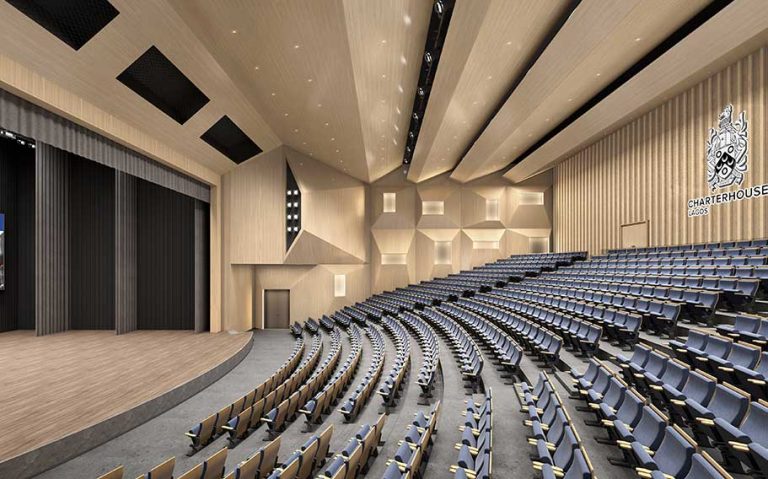
Inside Charterhouse Lagos, A newly commissioned primary school in Lekki with its secondary school underway that charges N42m as a fee per annum.
Charterhouse Lagos is the first British independent school in West Africa and part of the prestigious Charterhouse family of schools.
Here are inside photos of the school which is set to resume in September.
Below are photos courtesy The PUNCH:
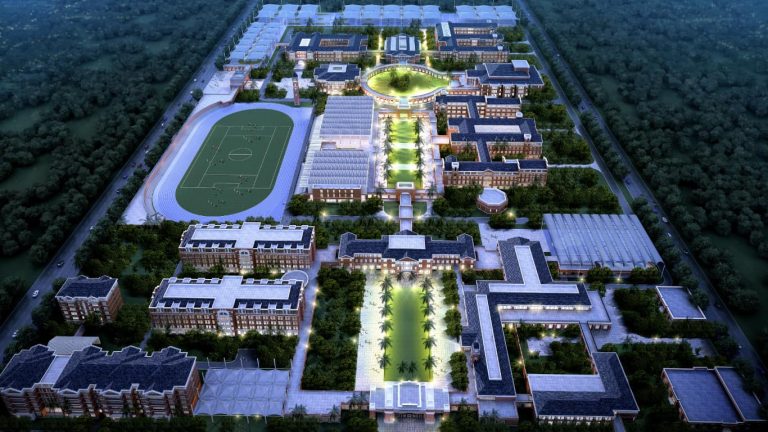
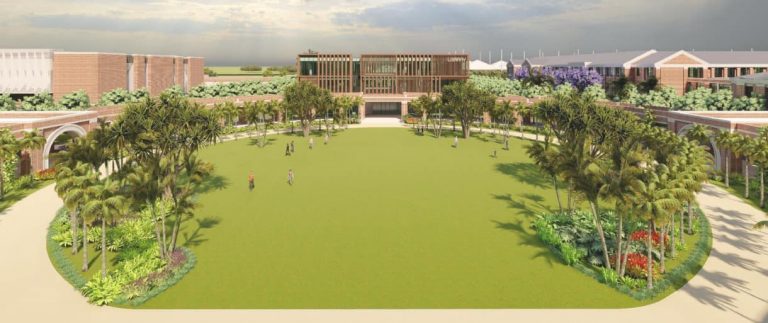




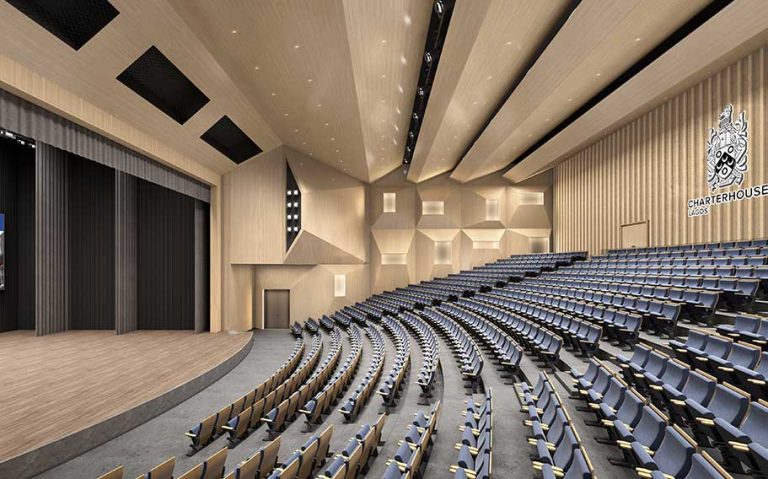
READ ALSO: Alleged N42b debt: AMCON Moves Against Firm’s MD, Directors
News
Poor Power Supply: FG To Unbundle 11 Discos, Orders Sale Of Four
Published
4 hours agoon
April 23, 2024By
Editor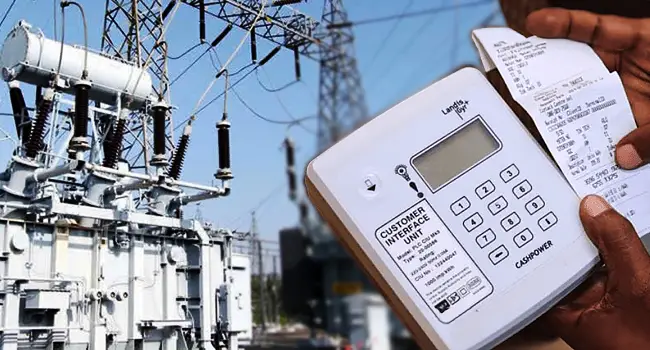
Power distribution companies in Nigeria are currently being unbundled along state lines due to their large sizes which often result in inefficiency and ineffectiveness, the Federal Government declared on Monday.
It stated that the privatisation of the firms would not be reversed, but stressed that the Discos would be broken into more efficient structures along state lines so as to be able to deliver on their mandates.
This came as the Federal Government also ordered the sale of Discos that have been taken over by banks and the Assets Management Corporation from its original investors/owners.
Currently, four Discos are under the management of banks and AMCON.
Abuja Electricity Distribution Company is under the management of the United Bank of Africa (UBA), while Fidelity Bank manages Benin Electricity Distribution Company, Kaduna Electricity Distribution Company, and Kano Electricity Distribution Company.
The Ibadan Electricity Distribution Company is under the AMCON management.
The four Discos are under these new managements due to their inability to repay their loans to the financial institutions.
The government stated that those who acquired the Discos when the firms were officially privatised in November 2013, lacked the required expertise and financial capacity to run the companies.
This came as the Senate Committee on Power lambasted the Discos for being so inefficient since they took over the privatised assets over 10 years ago, and called for the overhaul of the power firms.
In his address, while playing host to the Senate Committee on Power, led by their Chairman, Senator Eyinnaya Abaribe, the Minister of Power, Adebayo Adelabu, stated that the Federal Government had commenced the restructuring of Nigeria’s 11 power distribution companies.
He also revealed that over 100 projects of the Transmission Company of Nigeria have not been completed since 2001, a period of about 23 years.
READ ALSO: National Grid Collapses Again, Throws Nigerians Into Blackout
Adelabu said, “We are unbundling the Discos along state lines. Some of the Discos are too big for efficiency. They are too big for effectiveness. Ibadan Disco covers seven states. It is practically impossible for them to be efficient.
“So we are rearranging and restructuring the Discos along state lines so that each state government will know the responsible Disco for their states. Also, the federal and state governments should start exercising their rights in the operation and management of the Discos because we still own 40 per cent in the firms.
“But we have left it for the private sector operators for too long and they have messed it up. So the government must come back to take over its own right in the Discos. We are also planning to franchise the unserved communities under the Discos.”
The minister went ahead to state that “we will start seeing regulations about franchising. The fact you are Eko Disco doesn’t mean that you cannot have smaller Discos that are ready to invest in your unserved communities. So we are looking at franchising.”
Adelabu further revealed that the Oyo State Government had written to the Federal Government stating that it wants to exercise its rights in Ibadan Disco.
He said the Nigerian Electricity Regulatory Commission has been made to realise that it must sanction Discos that fail to perform, as the licences of some of the power firms might be withdrawn for non-performance.
“We are transforming the Discos and very soon you’ll see that a lot of tough decisions will be taken against these Discos because they are the last mile in the sector. If they don’t perform then the entire sector is not performing.
“So we have put pressure on NERC to make sure that it raises the bar on the activities of the Discos. If it has to withdraw licences for non-performance, why not? If it has to change the boards and managements, why not?
“And all the Discos that are still under AMCON (Asset Management Corporation of Nigeria) and some lenders (banks), within the next three months they must be sold to a technical power operator with a good reputation in utility management.
“We can no longer afford AMCON to run our Discos. We can no longer afford the banks to run our Discos. This is a technical industry and it must be run by technical experts,” the power minister stated.
Also commenting on the non-performance of Discos, a member of the committee, Senator Danjuma Goje said, “The Discos have not added anything significant to the power sector, but are just going about collecting money.
READ ALSO:Blackout As National Grid Collapses Again
“The Discos are complete failures and should be overhauled. They have failed to live up to expectations and we have so many complaints about their poor performances.”
The Senate committee also authorised an investigative hearing on the electricity tariff hike and stated that this would be held on April 29, 2024, at the Senate.
Privatisation problems
The power minister told his guests that those who acquired the Discos when they were privatised, lacked the required expertise and financial capacity.
Adelabu said, “Our problem started from the privatisation era. Not that the privatisation has a problem in itself, but its implementation and execution have robbed the process of its laudable objectives.
“We believe that people who bought the power companies do not have the required expertise to run the utility firms. Secondly, they were not buoyant enough in terms of financial buoyancy to pay for the power plants.
“All of them used bank loans to pay for the assets. And we all know that the power business is a long-term business. It is not something you recoup your capital and make profit in a short time. So they were all under pressure to repay the bank loans that they used to acquire the power companies.
“This is why today a number of them have been taken over by their lenders, either AMCON or the banks, both local and international banks. They also promised to invest and enhance the distribution network, but they did not do this.”
The minister stated that the investors had promised to reduce the losses in the Discos, but stressed that up till now the losses had remained at about 40 per cent across the power value chain.
“So the Discos are not investing as expected,” Adelabu stated.
100 uncompleted projects
The minister told the lawmakers that over 100 power transmission projects have not been completed since 2001.
“Since 2001 till date we have over 100 uncompleted projects of the Transmission Company of Nigeria. So when we say the government has spent so much in the sector, it is true. But all the spendings have not translated to good impact on power users.
READ ALSO: Nationwide Blackout Looms As NUEE Threatens To Shut Down National Grid
“This is because majority of these projects have not been completed, though some of them are 80 or 90 per cent completed. We have over 65 projects on power substations that are still ongoing since 2001, which is 23 years ago.
“We have about 62 lines projects across the country that were started and have not been completed. And these are being affected by exchange rate calculations, inflation, variations, etc. One thing about power projects is that if they are not completed 100 per cent, you cannot energize them,” Adelabu stated.
He said all the investments are just there lying in waste, “but we are saying that this year we must ensure that a significant number of these projects are completed so that Nigerians can enjoy the investments in the transmission company.”
On the metering gap in the power sector, the minister stated that a company received $200m in 2003 to provide three million meters but failed to do so.
“In 2003, the metering gap was less than four million meters and the Federal Government gave out $200m to a particular company to acquire three million smart meters for the industry. It was a revolving loan.
“But it is sad to let you know that this is 21 years after, no single meter was acquired by this company and the $200m which was N32bn at the time, nothing was got from the money until Mr President just gave us the approval to terminate this loan.
“He also asked us to implement the metering of the Nigerian Army formations to the tune of N12bn. You can imagine if we had acquire three million meters 21 years ago. Today the metering gap that we have is over eight million out of over 12 million customers of the power sector,” the minister stated.
Adelabu, however, noted that the Federal Government was working hard to close the metering gap.
“Mr President has come to our aid on this by forming a Presidential Metering Council, which I’m the Chairman, and he has given us a mandate that a minimum of two million meters should acquired and distributed to Nigerians every year.
“This is going to continue till the next four to five years, so that the current eight million metering gap that we have will be closed over the next four to five years.
“The funding for this project is being sourced. We have been given a seed capital of N75bn and the Nigeria Sovereign Investment Authority is coming to our aid in terms of capital for this,” Aselabu stated.
READ ALSO: Tinubu Unveils African Counter-Terrorism Summit
The minister also stated that the target of the Federal Government is to achieve 6,000MW of power before the end of this year, adding that this has been submitted to the President.
He called for the payment of the outstanding debts to gas companies and power generation firms.
He said the government is currently talking with two investors that should invest in the construction of 3,000MW of solar-power projects in various states to support the national grid.
The minister pointed out that Nigeria currently has an installed power generation capacity of about 14,000 megawatts.
He said, “Today we have a total of 13,250MW installed capacity in all the generating units, including hydro plants and thermal plants. If we add the 700MW coming from the recently Zungeru plant we will have close to 14,000MW installed capacity.
“But it is sad to let you know that the highest we have ever generated in this sector is 5,800MW out of an installed capacity of over 13,000MW, which is less than 50 per cent. The infrastructures are there lying fallow without adequate maintenance and the turbines are getting rusty.
“Two things are responsible, which include the inadequate transmission capacity to evacuate this power even when it is generated. The second thing is the inadequate demand coming from the Discos because they are not getting full payments from the consumers when they distribute power to them.”
Adelabu said the 5,800MW was generated in March 2021, which was over three years ago.
“But we believe that with good investments and demand for power, we can increase power generation to over 8,000MW once there is adequate infrastructure,” he stated.
PUNCH

20-year-old English Midfielder, Bellingham Wins 2024 Laureus World Sports Breakthrough Award

10 Killed As two Military Helicopters Collide

BREAKING: Dangote Further Crashes Diesel, Aviation Fuel Price
Trending

 News5 days ago
News5 days ago‘Have Some Conscience’ – Lady Tackles Salvation Ministries Founder, Ibiyeomie, Over 20% Of Salary As Offering Preaching [VIDEO]

 News4 days ago
News4 days agoAPC Debunks Viral Video, Says Presidency Not After Ganduje

 Metro5 days ago
Metro5 days agoPolice Rescue Three Toddlers Locked Up In Lagos Home

 Headline5 days ago
Headline5 days agoJUST IN: Chief Of Defence Forces Involved In Chopper Crash

 Politics2 days ago
Politics2 days agoEdo Guber: Akoko-Edo PDP Leaders Meet In Igara, Describe Ighodalo, Ogie As ‘Perfect Match’

 Headline4 days ago
Headline4 days agoBest Airports In Africa For 2024 Named, Nigeria Missing [Full List]

 Entertainment18 hours ago
Entertainment18 hours agoBridesmaids’ Dance At Wedding Causes Stir On Social Media [VIDEO/PHOTOS]

 News3 days ago
News3 days agoFoundation Advocates Empowerment Of Women, Youth In Nigeria

 Metro4 days ago
Metro4 days agoBREAKING: Protests As Gunmen Kill 12 In Plateau Village

 Headline5 days ago
Headline5 days agoUPDATED: Defence Chief, Nine Others Die In Kenya Military Helicopter Crash




















